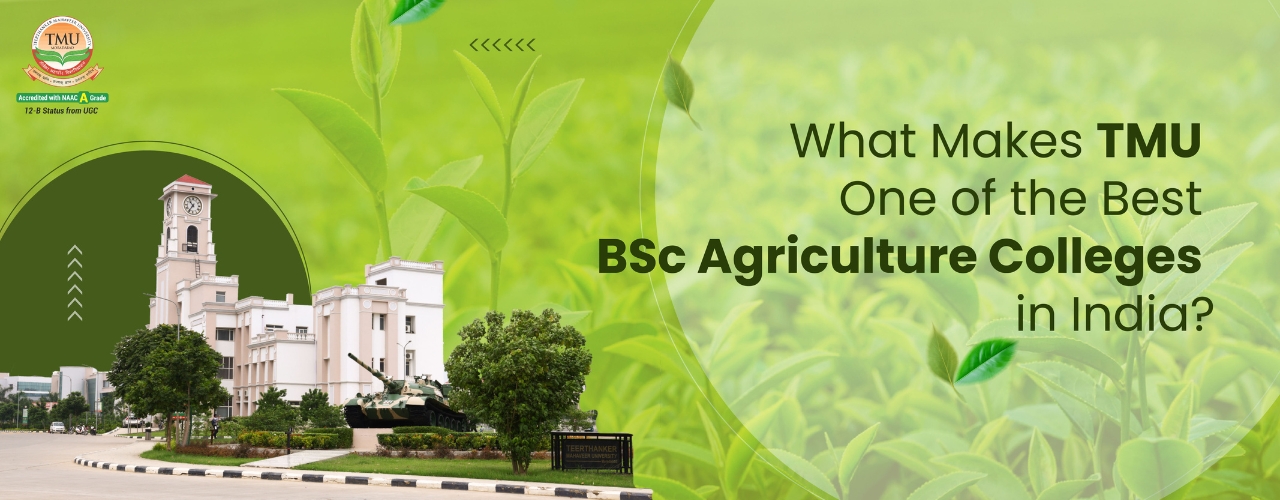What Makes TMU One of the Best BSc Agriculture Colleges in India?
Table of Contents
Agriculture isn’t just about ploughing fields anymore. In today’s rapidly evolving world, agriculture is a high-tech, science-driven, and innovation-centred industry—the backbone of any nation’s economy, especially in a country like India. With the global population rising and the pressure on food systems intensifying, there’s a growing demand for professionals who understand sustainable farming, biotechnology, and agribusiness.
Enter BSc Agriculture—a program that blends scientific knowledge with real-world applications. It’s no longer just for students from rural backgrounds; it attracts students with a keen interest in environmental sustainability, technology, biology, and economics. This programme is particularly attractive today due to its diversity, providing opportunities for careers in research, agro-industries, policy-making, entrepreneurship, and even international development.
Because a great BSc Agriculture college doesn’t just teach—it transforms students into leaders. And that’s where Teerthanker Mahaveer University (TMU) shines. TMU has carved out a niche for itself in India’s academic landscape, especially in the agriculture sector.
Quick Overview: Why TMU is Among the Best BSc Agriculture Colleges in India
| Section | Details |
| Program Offered | BSc Agriculture (4-year undergraduate program) |
| Recognitions | UGC Approved, NAAC Accredited, ICAR-Aligned Curriculum |
| Faculty Strength | PhD-qualified, experienced professionals with research & industry exposure |
| Infrastructure | Smart classrooms, fully-equipped labs, experimental farms, and Agritech Labs |
| Curriculum Highlights | Industry-relevant, practical-oriented, elective specialisations offered |
| Research Opportunities | Research cells, patents, agri-projects, field innovations, student publications |
| Hands-On Learning | Field visits, internships with agri-companies, and rural immersion programs |
| Collaborations | MoUs with national & international agri-bodies and universities |
| Scholarships | Merit-based, need-based support for rural students |
| Personality Development | Workshops, seminars, leadership camps, entrepreneurship training |
| Placement Support | Career cell, top recruiters (Syngenta, ITC Agri, Bayer, etc.), personalised guidance |
| Career Paths | Government jobs, agri-business, research, agri-startups, global NGOs |
| Alumni Success | Government officers, startup founders, researchers in leading institutions |
| Sustainability Focus | Organic farming projects, green campus initiatives, solar and water-saving systems |
| Admission Process | Application > Screening/Interview > Document Verification > Fee Payment > Enrollment |
| Eligibility | 10+2 in Science (Bio/Agri/Maths) with 50% marks minimum |
| Unique Selling Point | Holistic education blending traditional agricultural knowledge with future-ready tech skills |
Teerthanker Mahaveer University
Apply for Admission
Click Here To Apply for Admission
Overview of Teerthanker Mahaveer University (TMU)
A Brief History and Vision of TMU
TMU, located in Moradabad, Uttar Pradesh, was established in 2008 with a clear mission: to provide quality education infused with values and a global outlook. Over the years, it has become a hub for innovation, learning, and community impact. What makes TMU more than just another private university is its commitment to not just imparting education but also shaping well-rounded individuals.
The university hosts over 140 academic programs, ranging from engineering to law and from nursing to agriculture. Its School of Agricultural Sciences, in particular, stands out for its modern approach to traditional practices. By integrating cutting-edge technology with grassroots farming knowledge, TMU prepares its students to become future-ready professionals.
TMU’s Recognition and Accreditation Status
What gives TMU credibility is its range of national recognitions and accreditations. The university is approved by the University Grants Commission (UGC), and its agriculture programs align with the standards set by the Indian Council of Agricultural Research (ICAR). These recognitions ensure that students receive a curriculum that meets national and global standards.
In addition to academic validation, TMU demonstrates its commitment to quality education through its NAAC accreditation and ISO certifications. The emphasis on research, faculty development, and student support makes TMU not just a learning space but a launchpad for success.
TMU’s Faculty Excellence in Agriculture
Highly Qualified and Experienced Faculty
Faculty is the backbone of any educational institution, and TMU’s agriculture department is no exception. The university prides itself on having some of the most qualified and experienced educators in the field of agricultural sciences. From PhD holders to scientists with international exposure, the faculty brings a wealth of knowledge to the classroom.
But it’s not just about degrees and accolades—the professors here are deeply committed to teaching. They use innovative pedagogy, including case studies, project-based learning, and field demonstrations. Students don’t just listen—they participate, debate, and experiment. This approach significantly enhances the learning experience.
Industry and Research Exposure for Educators
One reason TMU is considered among the best BSc Agriculture colleges in India is the real-world exposure the faculty provides. Many of them are involved in national and international research projects, consult for agrotech companies, or contribute to policy-making bodies. This means students get access to insights that go beyond textbooks.
Regular guest lectures, industry collaborations, and live project mentoring ensure that students are always in sync with what’s happening on the ground. Whether it’s learning about the latest in soil science or how drones are being used in precision farming, the faculty at TMU ensures students are future-ready.
State-of-the-Art Infrastructure and Facilities
Smart Classrooms and Laboratories
TMU has heavily invested in building a campus that fosters learning through experience. Classrooms here aren’t just whiteboards and desks—they’re tech-enabled learning spaces. Smart classrooms with audio-visual aids make theoretical sessions engaging and interactive. But where TMU truly stands out is its laboratory infrastructure.
TMU equips its agriculture labs with the latest tools for soil testing, plant pathology, seed analysis, and agricultural biotechnology. These labs give students hands-on training, helping them connect theory with practice. Students have the necessary tools at their disposal to understand genetic traits in crops and analyse pest resistance.
Experimental Farms and Agritech Labs
What sets TMU apart from many other universities is its sprawling on-campus experimental farms. These farms serve as living laboratories where students apply what they learn. From planting to harvesting and irrigation to pest control, students manage the entire lifecycle of crops. It’s not just practice—it’s immersive learning.
Additionally, TMU has set up Agritech Labs that focus on modern technologies like hydroponics, vertical farming, and smart irrigation systems. These facilities ensure students stay updated with global trends in agriculture. This combination of traditional knowledge and futuristic tech is what makes TMU’s infrastructure truly exceptional.
Comprehensive and Industry-Relevant Curriculum
Practical-Oriented Course Structure
Unlike outdated syllabi that still haunt many institutions, TMU’s BSc Agriculture programme is designed in consultation with industry experts and academia. The course effectively balances theory with practical training. Subjects range from soil science, agronomy, entomology, and horticulture to modern agribusiness management and agricultural marketing.
Every semester includes practical hours, fieldwork, and project-based learning. Students don’t just study crop cycles—they experience them. They don’t just read about supply chains—they map them out. This kind of immersion ensures that TMU graduates are not just degree holders but skilled professionals.
Specialisations and Electives Offered
TMU also allows students to choose electives based on their interests. Whether you’re inclined towards organic farming, biotechnology, or agri-economics, there’s something for everyone. This flexibility allows students to tailor their learning journey and focus on what excites them most.
These electives are not just fillers—they are designed to offer depth in specific areas. This means by the time students graduate, they have both breadth and depth of knowledge—a rare combo that gives them a competitive edge in placements and higher studies.
Research and Innovation Culture at TMU
Active Research Cells and Agri Projects
One of the defining features of a top-tier agriculture institution is its commitment to research and innovation. At TMU, this isn’t just a buzzword—it’s a culture. The university has dedicated research cells within the School of Agricultural Sciences, where students and faculty collaborate on real-time agricultural challenges. Whether it’s studying crop resilience, developing organic pesticides, or improving irrigation efficiency, students are involved from ideation to execution.
What makes this environment special is how research is treated not as a separate entity but as an integral part of the curriculum. Students are encouraged to take on mini-research projects, participate in inter-university competitions, and publish their findings in national and international journals. These experiences not only honed their analytical and problem-solving skills but also instilled a scientific temperament.
Patents, Publications, and Field Innovations
TMU’s focus on innovation has already borne fruit. The university has filed several patents in agricultural technologies and sustainable practices. For example, student-led projects on organic composting and natural pest repellents have gained recognition on various platforms. These aren’t just academic exercises—they have real-world implications and have been adopted by local farmers.
The faculty also regularly publish papers in reputed journals and often co-authors with students. These publications cover a wide spectrum—from genetic crop modification to climate-resilient agriculture—making TMU a thought leader in the field. What’s more, many of these research outcomes are tested directly on the university’s experimental farms, ensuring a closed loop of research, implementation, and feedback.
Hands-On Learning through Field Visits and Internships
Collaboration with Agricultural Bodies and Companies
TMU recognises that agriculture is a complex ecosystem that encompasses farmers, suppliers, corporations, NGOs, and government bodies. That’s why it has forged collaborations with several stakeholders across this spectrum. The university regularly partners with agricultural extension services, Krishi Vigyan Kendras (KVKs), agro-based industries, and even international NGOs.
These collaborations result in regular field visits for students. They get to interact directly with farmers, observe farming practices in diverse geographies, and even help implement pilot projects. This kind of exposure is invaluable—it gives students a ground-level understanding of challenges and opportunities in the sector.
Student Training Programs and Rural Immersion
Another standout feature of TMU's approach is its rural immersion programs. These initiatives place students in rural communities where they live and work with farmers, agribusiness owners, and local institutions. It's a transformative experience that teaches empathy, problem-solving, and innovation rooted in practicality.
Internships are also a major part of the program. TMU has tie-ups with agribusinesses, seed companies, organic farms, and even multinational corporations. These internships allow students to experience the business side of agriculture—marketing, logistics, supply chain management, and more. When students graduate, they carry with them not just a degree but a resume rich in experience.
Collaborations, MoUs, and Global Exposure
National and International Tie-ups
TMU ensures its students stay ahead in the increasingly globalised world of agriculture. The university has signed multiple memoranda of understanding (MoUs) with top agricultural institutions and universities, both within India and abroad. These tie-ups pave the way for joint research, curriculum development, and student exchange programs.
Domestically, TMU collaborates with top ICAR institutes, IARI, and state agricultural universities to keep its curriculum aligned with the latest developments. Internationally, it has associations with universities in countries like Israel, the Netherlands, and Canada—nations known for their advanced agricultural practices. These connections give TMU students insights into global best practices and technologies.
Exchange Programmes and Guest Lectures
Through its exchange programmes, TMU offers select students the chance to study a semester abroad. These experiences broaden their horizons and give them a global perspective on agricultural issues like climate change, food security, and technology transfer. The university also frequently hosts guest lectures by international experts, researchers, and policymakers.
These sessions are more than just motivational talks—they’re knowledge-packed seminars where students engage in discussions, Q&A sessions, and case studies. For a BSc Agriculture student, this is golden—it gives them exposure, networking opportunities, and a real sense of what agriculture looks like beyond India’s borders.
Student Support, Scholarships, and Financial Aid
Merit-Based Scholarships
TMU believes that financial limitations should never come in the way of a student’s dreams. That’s why the university offers a wide range of scholarships to deserving students. These include merit-based scholarships for students with outstanding academic records, scholarships for students excelling in extracurricular activities, and performance-based renewals each semester.
The university’s transparent and accessible scholarship policy ensures that students from diverse backgrounds can apply. This inclusivity attracts a vibrant mix of learners, making TMU a melting pot of ideas, cultures, and experiences. It’s not just about waiving fees—it’s about nurturing potential.
Financial Support for Rural and Needy Students
Since many BSc Agriculture aspirants come from rural or economically weaker sections, TMU has created financial support schemes tailored for them. These include need-based scholarships, tuition fee concessions, and even support for hostel and living expenses. TMU works with NGOs and philanthropic organisations to extend support to those who need it the most.
This support doesn’t end once the student enrols. Throughout the course, there are mechanisms like academic mentoring, psychological counselling, and peer learning to ensure students don’t just survive but thrive. It’s this holistic support system that makes TMU more than just a university—it’s a second home for its students.
TMU’s Emphasis on Personality and Leadership Development
Workshops, Seminars, and Conferences
Academic excellence is crucial, but so is the ability to communicate, lead, and adapt. TMU recognises this and invests heavily in the soft skills development of its agriculture students. The university conducts regular workshops on public speaking, teamwork, digital literacy, and problem-solving.
Students are also encouraged to participate in national and international conferences. These events help them present their research, gain confidence, and build a professional network. TMU has even hosted several agriculture-themed symposiums where students interact with policymakers, industry leaders, and innovators.
Soft Skills and Entrepreneurial Training
In today’s world, a BSc Agriculture graduate can be more than just an employee—they can be an entrepreneur. TMU nurtures this mindset through entrepreneurship training programmes. Students learn how to create business models, write proposals, and even pitch ideas to real investors. Agri-startups, farm-based tourism, and organic food processing—students are encouraged to explore these and more.
Through incubation centres and innovation labs, TMU provides the tools and mentorship required to turn ideas into ventures. Combined with soft skills training, leadership coaching, and industry exposure, TMU ensures its graduates aren’t just job seekers—they're job creators.
Career Opportunities after BSc Agriculture at TMU
Campus Placements and Career Services
A BSc Agriculture degree from TMU isn’t just a certificate—it’s a career launchpad. TMU’s dedicated Career Development Cell works tirelessly to bridge the gap between students and industry. From the moment a student enrols, the cell begins grooming them for the professional world. Mock interviews, resume-building workshops, aptitude training, and career counselling are part of this continuous process.
TMU maintains strong relationships with agro-based industries, research institutions, government agencies, and agribusiness corporations. This results in consistent campus recruitment drives where companies come scouting for fresh talent. Leading names like Syngenta, Bayer CropScience, ITC Agri, Mahindra Agribusiness, and even public sector undertakings frequently participate.
What truly makes a difference is TMU’s commitment to placing each student in a role aligned with their strengths and interests. Whether it's agronomy, marketing, biotechnology, or agricultural analytics, students are guided into careers that match their aspirations. This level of personalised placement support is rare and sets TMU apart from many other institutions.
Opportunities in the Government and Private Sector
A BSc in Agriculture opens the door to numerous career paths, especially in a country where agriculture employs more than half the workforce. TMU’s strong academic foundation and real-world exposure make its graduates top contenders for prestigious government positions like Agriculture Officer, Field Officer, Krishi Vigyan Kendra Scientist, and positions in NABARD and ICAR.
In the private sector, career options abound. Graduates can work as agronomists, soil analysts, farm managers, crop scientists, or even agri-journalists. Those with a flair for business can venture into agri-entrepreneurship or join marketing teams of seed, fertiliser, and machinery companies. And thanks to TMU’s industry-focused training, students don’t just get jobs—they build fulfilling careers.
Alumni Success Stories
Achievements of TMU Agriculture Graduates
Nothing speaks louder about an institution’s quality than the success of its alumni. TMU takes immense pride in its graduates who are now making waves across sectors. Many have gone on to crack competitive exams like UPSC (Indian Forest Services), ICAR JRF, and state-level agriculture service commissions. Others have taken up research positions in reputed institutions like IARI and CSIR labs.
Several alumni have also launched successful agri-startups focused on organic farming, precision agriculture, and agritech services. Their ventures have not only created employment but have also brought innovation to the grassroots level. TMU supports and showcases these alumni to inspire current students and foster a culture of excellence.
Testimonials from Former Students
Former students often credit TMU’s inclusive and nurturing environment for their success. One such alumnus, now working with an international NGO on climate-smart agriculture, recalled how a field visit during his second year completely changed his career path. Another, who founded an organic farming company, shared how the hands-on training and entrepreneurship mentorship at TMU helped her turn a passion into a profitable business.
These real-life stories resonate deeply with current students, encouraging them to dream big and make a difference. Alumni also regularly return as guest speakers or mentors, creating a strong, supportive network that continues to grow.
TMU’s Role in Sustainable and Organic Farming
Green Initiatives on Campus
At a time when sustainability is the need of the hour, TMU has taken several commendable steps to promote eco-friendly practices. The agriculture department actively practices what it preaches by implementing water harvesting systems, composting units, and solar-powered irrigation on its experimental farms. These green initiatives serve as live models for students and demonstrate how sustainability can be integrated into daily operations.
The university also hosts annual events like "Green Week," where students engage in plantation drives, recycling projects, and awareness campaigns. This instils a sense of environmental responsibility among students—something that's critical in modern agriculture.
Organic Farming Training and Projects
TMU is at the forefront of promoting organic farming. The curriculum includes specialised training modules on organic practices, certification processes, and market linkages. Students get to work on dedicated organic farm plots, learning everything from preparing organic compost to market produce through farmer markets and local tie-ups.
The university also encourages students to pursue mini-projects on organic pest management, indigenous seed preservation, and bio-fertiliser development. These projects aren’t just academic—they’re practical, scalable, and impactful. TMU’s vision of promoting sustainability through agriculture makes it a unique and responsible education provider.
Why TMU Stands Out from Other Agriculture Colleges
Holistic Development Approach
So, what truly makes TMU one of the best BSc Agriculture colleges in India? It’s the holistic approach. At TMU, education doesn’t stop in the classroom. The university believes in developing well-rounded individuals who are intellectually sharp, emotionally intelligent, and socially responsible.
From yoga and meditation sessions to leadership camps and community service, every aspect of a student’s development is taken care of. This broad-based learning ensures that TMU graduates are not just professionals but thoughtful, empathetic leaders ready to tackle real-world problems.
Student-Centric Learning Environment
Unlike many institutions where students often feel like just another number, TMU prioritizes student well-being and growth. Small class sizes, personalized mentorship, open-door policies, and 24/7 access to learning resources create a student-first environment. Feedback is taken seriously, and students actively participate in curriculum design, event planning, and policy discussions.
There’s also a vibrant student life with clubs, sports, cultural events, and academic societies. This balance between academics and co-curriculars ensures that students are not just qualified but also confident and capable.
Admission Process and Eligibility Criteria
Step-by-Step Admission Process
Getting into TMU’s BSc Agriculture program is straightforward. Here’s how it works:
- Application Form: Available both online and offline, applicants need to fill out the admission form with academic details.
- Entrance Test/Screening: Depending on the intake policy, students might have to appear for an entrance exam or personal interview.
- Document Verification: Once shortlisted, students must submit all required documents for verification.
- Fee Payment: After verification, the first-semester fee must be paid to confirm admission.
- Enrolment: Students receive an official welcome and are enrolled into the program.
The admissions team is highly responsive and helps guide students through every step.
Eligibility and Required Documents
To be eligible for admission, students must have completed 10+2 with science (Biology/Agriculture/Mathematics) with at least 50% marks. Reserved category students may receive relaxation as per government norms.
Required Documents:
- 10th and 12th mark sheets and certificates
- Transfer/migration certificate
- Passport-size photographs
- ID proof (Aadhar card or equivalent)
- Caste certificate (if applicable)
TMU maintains complete transparency in its admission process, ensuring equal opportunity for all deserving candidates.
Conclusion
TMU isn’t just a university—it’s a launchpad for the future of Indian agriculture. With its strong academic foundation, cutting-edge research, global exposure, and student-centric approach, TMU offers everything a BSc Agriculture aspirant could hope for. In a time when agriculture is undergoing rapid transformation, TMU equips its students to not just adapt but to lead that change.
From its lush experimental farms to high-tech labs, from organic farming modules to entrepreneurship training—TMU provides an immersive, holistic education that sets students up for success in every possible direction. If you're passionate about agriculture and dream of making a difference in the world, Teerthanker Mahaveer University is where you should begin.
FAQs
Q1: What is the duration of the BSc Agriculture program at TMU?
Ans: The BSc Agriculture program at TMU spans 4 years (8 semesters) and includes both theoretical coursework and practical training.
Q2: Does TMU offer placement assistance for agriculture students?
Ans: Yes, TMU has a dedicated placement cell that assists students with internships and full-time job opportunities across the agricultural industry and related sectors.
Q3: Are there any research opportunities during the course?
Ans: Absolutely. TMU encourages students to engage in research projects, paper publications, and innovation competitions throughout their studies.
Q3: Is a hostel facility available for agriculture students?
Ans: Yes, TMU provides separate hostel facilities for boys and girls, complete with modern amenities, 24/7 security, and recreational areas.
Q4: What makes TMU’s BSc Agriculture course unique?
Ans: TMU combines academic excellence with practical exposure, including fieldwork, organic farming projects, global collaborations, and leadership training, making it one of the best in India.















